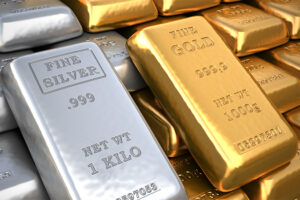Saxo Bank's Shocking Predictions for 2023: War Economy
Saxo Bank published 10 Shocking Predictions for 2023. It is a series of unlikely but often underestimated events, the materialization of which could cause a shock in the financial markets, as well as in the area of political and popular culture.
Forecasting should be treated as a thought experiment in considering all possibilities - even those perceived as unrealistic - which materialize from time to time. Saxo Bank recently published a self-formulated list Shocking predictions that finally came true, it was e.g. forecast for the exit of Great Britain from the European Union.
While these events are not Saxo Bank's baseline forecasts for 2023, all major market movements are usually the result of something shocking. In a world where central banks and governments are losing the fight against inflation, there is a risk that markets will be as shocking as ever in 2023 and beyond.
“This year's Shocking Forecasts assume that any belief in a return to pre-pandemic disinflationary dynamics is impossible, as we have entered the era of a global war economy. Every major world power is now seeking to strengthen its national security on all fronts - both in a literal military sense and in the context of deep uncertainty about supply chains, energy and even finance, the failure of which has been exposed by the pandemic and Russia's invasion of Ukraine. - says Steen Jakobsen, Chief Investment Officer at Saxo Bank.
A world at war
The Shocking Predictions for 2023 were inspired by the similarities between today's Europe and the state of the Old Continent at the beginning of the 1910th century. Norman Angell in XNUMX published the book "The Great Illusion" (The Great Illusion), in which he argued that there was no possibility of Europe getting embroiled in a major war again. After all, in the previous decades of peace and prosperity, trade that was beneficial to all developed on a huge scale. In just ten years, Europe lay in ruins after a nightmarish war of attrition.
In 2022, the situation repeats itself, a Russia's invasion of Ukraine surprised many people. Few could understand why Russian President Vladimir Putin was risking war losses and putting his country in economic hardship after two decades of thriving and highly profitable export-based trade primarily in the mining industry, mainly to Western Europe and the rest of the world.
The invasion of Ukraine revived Europe's war-economy mentality on a scale not seen since 1945. This is not just Western Europe's woefully inadequate military capacity, but also a German-based industrial model that has been put to an existential test by cutting off from cheap, plentiful supplies of oil and gas from Russia.
Three of the shocking predictions for 2023 concern possible European response to this difficult situation; one foresees the creation of an EU armed force, while another for the emergence of a political dysfunction in France that could precipitate another existential crisis for the European Union. Finally, the UK may unexpectedly be too small to pretend to be able to remain an independent entity in a world that has suddenly become so much bigger. Against this backdrop, Saxo Bank makes the Shocking Prediction that there will be a referendum on the issue next year "Brexit Reversals".
Saxo Bank predicts that the initiators of the war economy will be global powers. The US and China will permanently adopt a war economy mentality as their trade and technology rivalry escalates. Satellite countries may find it difficult to continue to seek non-involvement "commercial cold war". It is clear from the reaction to Russia's invasion of Ukraine that any country other than Washington's longtime military ally will find it unacceptable to risk using the global dollar-based system as a weapon. Saxo Bank therefore anticipates that these countries will hold a conference and select a new reserve currency to completely disassociate themselves from the dollar-based system.
If Saxo Bank's 2023 war economy thesis turns out to be correct, continued high inflation is to be expected. If at the end of next year inflation even slightly exceeds half of the 2022 peak, shocking results are almost guaranteed.
In 2023, investors may overestimate the positive impact of a likely recession on inflation. Whether a housing and credit recession occurs or not, the near-inexhaustible need to invest in the new priorities of the war economy will increase the risk of inflation. From securing long-term energy supplies to relocating production to create local supply chains for key commodities and expanding military capabilities, any slowdown in private sector demand will be more than offset by public sector spending.
And while central banks say they're trying to fight inflation, they don't really want to be "over-successful" in this regard. This is because, in the long run, a heavily indebted state almost always chooses slow, murderous inflation over austerity or outright bankruptcy.
SAXO BANK 2023 SHOCKING PROJECTIONS
1. A coalition of billionaires creates the trillion-dollar Manhattan Project for the energy sector

In 2023, the owners of the biggest tech companies and other billionaire technophiles will become impatient with the lack of progress in developing the necessary energy infrastructure that would allow them to both realize their dreams and tackle the necessary energy transition. Joining forces, they will form a consortium - let's call it Third Stone - to raise over a trillion dollars to invest in energy solutions.
It will be the largest research and development project since the Manhattan Project, which created the first atomic bomb. In addition to research and development activities aimed at exploiting the potential of existing and new technologies, the fund will also focus on integration, i.e. how to combine new power generation sources with base load energy transmission and storage infrastructure, which is the Achilles heel of current alternatives energy.
Impact on the market: Third Stone consortium partners that will be able to help realize its vision will appreciate strongly in a weak investment environment.
2. French President Macron resigns

In the June 2022 parliamentary elections, the party of President Emmanuel Macron and his allies lost an overwhelming majority in parliament. In the face of strong opposition from the left-wing alliance NUPES (fr. New People's Ecological and Social Union; New Ecological and Social People's Union) and the far-right National Union (fr. National Gathering) Marine Le Pen, the government will have no choice but to adopt the most important laws and the 2023 budget through an expedited decree - triggering Article 49.3 of the constitution. Nevertheless, bypassing the legislature cannot be a method of government in a democratic system. Macron will therefore realize that for the next four years he will be an easy target and will not be able to get his own pension reform approved by parliament. Following the example of Charles de Gaulle in 1946 and 1969, in early 2023, the French president unexpectedly decides to resign.
Macron's resignation will open the doors of the Elysée Palace to far-right candidate Le Pen, thus causing a wave of stupor throughout France and beyond, and generating a new existential challenge to the European Union project and its shaky institutional foundations.
3. Gold hits $3 as central banks disagree on inflation

In 2023 gold it will finally find its footing after a difficult 2022, in which many investors felt frustrated about the metal's inability to strengthen even as inflation soared to a 40-year high. In 2023, the market will finally discover that inflation will remain high for the foreseeable future. Fed tightening and quantitative tightening will lead to a new impasse in US Treasuries. This will force new insidious "measures" to be implemented to reduce volatility in the Treasury market, which will amount to de facto to the next round of quantitative easing. With the advent of spring, China is moving more decisively away from its "zero Covid" policy, implementing effective treatments and possibly even a new vaccine. Releasing Chinese demand will lead to a new spike in commodity prices. The result will be a sharp increase in inflation, especially in an environment of increasingly weaker dollar, as the Fed's easing stance will deal a blow to the US currency. Previously neglected by investors, gold will start to rise as a result of the ground-breaking changes in the implications for term real interest rates resulting from this new context.
In 2023, the toughest asset will receive further support from three sides. First, resulting from the geopolitical background of the growing war economy mentality of self-sufficiency and minimizing foreign exchange reserves in favor of gold. Second, from extensive massive investments in new national security priorities, including energy sources, energy transition and supply chains. Third, an increase in global liquidity as policy makers seek to avoid a catastrophe in bond markets as a mild recession in real economic growth becomes entrenched. Next year, gold will double top around $2 as if it were not there at all, reaching at least $075.
4. Establishment of an EU military force

Russia's invasion of Ukraine sparked Europe's biggest "hot war" since 1945, and the 2022 U.S. midterm elections saw the right-wing populist Republican party firmly in Congress, while former President Trump announced he intended to run for President in 2024. In 2023, it will become more obvious than ever that Europe needs to get its defenses back in order, relying less on the increasingly capricious US political cycle and facing the risk of the US withdrawing completely from its old commitments to Europe, perhaps after the Ukrainian-Russian ceasefire. In a dramatic move, all EU Member States will agree to establish an EU military force by 2028 to create complete and operational land, sea, air and space operational units, financed by a total expenditure of EUR 10 trillion, spread over 20 years. To finance the new EU armed forces, EU bonds will be issued based on the GDP of each Member State. This will greatly deepen the EU public debt market, while causing a strong strengthening of the euro as a result of a huge investment impulse.
5. The first country to ban meat production by 2030

According to one report, to meet the goal of net-zero emissions by 2050, meat consumption needs to be reduced to 24 kg per person per year, compared to the current OECD average of around 70 kg. The countries most likely to take into account the food aspect of climate change are those that have adopted legally binding net-zero emissions targets. Sweden has committed to becoming carbon neutral by 2045, while other countries such as the UK, France and Denmark have set a target of 2050. However, the carrot and stick approach rarely works, and in 2023 at least one the country, wanting to stay ahead of the others in the race for the most aggressive climate policy, will decide to introduce high taxes on meat on an increasingly large scale, starting from 2025. In addition, it will start working towards a complete ban on the domestic production of meat of animal origin by 2030. Citizens' appetites will have to cater for improved plant-based meats and even more humane, less carbon-intensive meat-growing technologies in labs to help save the environment and climate.
6. The UK is holding a referendum on Brexit reversal

In 2023, Rishi Sunak and Jeremy Hunt will see the Tories plummet to record lows as their brutal fiscal agenda pushes the UK into recession, with soaring unemployment and, ironically, soaring deficits as well. depletion of tax revenues. Due to the lack of a public mandate, numerous protests will break out demanding that Sunak call early elections. In a context of economic ruin, even in England and Wales, the polls will show widespread doubts about the legitimacy of Brexit. Sunak will eventually relent and call a new election, resigning to allow the new Tory leader to take the reins of the sinking party. Noting widespread support for a second Brexit referendum and rising poll numbers for the Liberal Democrats demanding a new referendum, Labor leader Keir Starmer will not take a firm stance on Brexit but will support a second referendum on re-joining the European Union in the terms of David Cameron's agreement reached before the original referendum in 2016. The Labor government will take power in the third quarter, announcing a referendum on 1 November 2023 on Brexit reversal. The supporters of re-accession to the Union will win.
Impact on the market: after a weak performance in early 2023, the GBP will strengthen by 10% against the EUR and by 15% against the CHF as a boost is expected for London's financial services sector.
7. Implementation of extensive price controls to curb official inflation

Inflation will remain a challenge to manage as long as globalization continues to reverse and long-term energy needs are met.
Almost every war has resulted in price controls and rationing that seem as inevitable as casualties at the front. Also in 2022, there were premature and chaotic initiatives to bring inflation under control. Taxes on windfall profits of energy companies predominate. At the same time, governments do not use the classic tool of resource rationing. Instead, they actively subsidize excess demand by setting maximum heating and electricity prices for consumers. In France, this simply means that utilities companies go bankrupt and must be nationalised. The bill is shifted to the government, then to the currency through inflation, after which Western authorities are likely to make a doomed effort to curb Russian energy prices from December 5. The goal is to deprive Russia of revenues and hopefully lower the price of oil exports around the world, but neither is likely to happen.
In a war economy, the firm hand of government will inexorably increase as long as price pressures threaten stability. There is a perception among policy makers that rising prices somehow suggest market failure and that more extensive intervention is needed to prevent inflation from destabilizing the economy and even society. Expect more and more price and even wage controls in 2023 – perhaps even something like a new National Price and Income Board in the UK and US.
But the effect will be the same as with almost any government policy: the law of unintended consequences will work. Controlling prices without addressing the underlying problem will not only increase inflation, but also threaten to tear apart the social fabric by lowering living standards by discouraging production and misallocating resources and investment. Only market prices will be able to ensure productivity and efficiency improvements through investments.
Impact on the market: see a shocking forecast for gold to rise to $3.
8. OPEC+ and Chindie exit the IMF and agree to trade with a new reserve asset

With the US government continuing to use the USD as a weapon, non-US allies will walk away from the USD and the IMF. They will create the International Clearing Union (ICU) and a new reserve asset - the bankor (currency code: KEY) - using Keynes's original pre-Bretton Woods idea to wipe the noses of Americans abusing their power over the international monetary system.
Impact on the market: Central banks of non-Washington allies will significantly reduce their dollar reserves, U.S. Treasury yields will soar, and USD will fall 25% against the basket of currencies settled with the new KEY asset.
9. Japan pegs USD/JPY at 200 to put its financial system in order

As 2022 rolls into 2023, pressure on JPY and the Japanese financial system will intensify again amid a global liquidity crisis triggered by Fed tightening and rising US Treasury yields. Initially, the Bank of Japan and the Ministry of Finance will try to remedy the situation by slowing down and then stopping currency interventions, seeing an existential threat to the country's finances after getting rid of more than half of the central bank's reserves. As USD/JPY crosses 160 and 170 and public protests against soaring inflation reach a climax, these authorities will realize that the crisis will require bold new measures. Once the USD/JPY crosses the 180 level, the government and the central bank will go into action.
First, they will announce a lower limit for JPY at 200 USD/JPY, announcing that this action will only be temporary with an unknown time horizon to allow the Japanese financial system to reset. This reset will involve explicit monetization of all debt securities held by the Bank of Japan, erasing their existence. Quantitative easing with monetization will be extended to further reduce the burden of Japanese public debt, but with a predetermined plan to reduce it over the next 18 months.
Thanks to this, at the end of the central bank's operations, public debt can fall to 100% of GDP, i.e. by more than half. The Bank of Japan benchmark rate will be raised to 1,00% and the yield curve control will be completely removed, allowing the 2,00-year rate to rise to XNUMX%. Banks will be recapitalized if necessary to avoid insolvency, and tax incentives to repatriate huge Japanese savings held abroad will bring trillions of yen back to Japanese soil, also as Japanese exports continue to grow.
As a consequence, Japan's real GDP will fall by 8% due to reduced purchasing power, even if nominal GDP increases by 5% due to the increase in the cost of living, but this reset will put Japan back on a stable path and establish an attractive response model in case of a similar crisis that will inevitably hit into Europe and eventually into the United States.
Impact on the market: For USD / JPY will reach 200, but will be on track to decline by the end of the year.
10. The tax haven ban kills private equity
In 2016, the European Union established an EU tax haven blacklist identifying countries or jurisdictions deemed "uncooperative" because they encourage aggressive tax avoidance and planning. It was a reaction to the leak Panama Papersmillions of documents revealing tax fraud by wealthy individuals, including politicians and athletes. As the war economy mentality deepens further in 2023, the national security outlook will increasingly turn inward towards industrial policy and the protection of domestic industries. Since defense spending, relocating production facilities and investing in the energy transition are costly, governments will explore all available potential sources of tax revenue and find easy solutions in the form of tax evaders through tax havens. Tax havens are estimated to cost governments between $500 and $600 billion a year in lost corporate tax revenue.
In 2023, the OECD will introduce a full ban on the world's largest tax havens. Funds in the United States private equity (Ang. carried interest) taxed as capital gains will also be shifted to ordinary income. The EU ban on tax havens and the US change in taxation rules carried interest shake up the entire industry private equity i venture capital, shutting down much of the ecosystem and causing the valuation of listed companies private equity will be reduced by 50%.
Impact on the market: iShares Listed Private Equity UCITS will fall by 50%.
The full version of the Shocking Predictions for 2023 is available here.






















![Forex Club – Tax 9 – Settle tax on a foreign broker [Download the Application] Forex Club - Tax 9](https://forexclub.pl/wp-content/uploads/2024/02/Forex-Club-Podatek-9-184x120.jpg?v=1709046278)
![Trading View platform – solutions tailored to the needs of traders [Review] trading view review](https://forexclub.pl/wp-content/uploads/2024/03/trading-view-recenzja-184x120.jpg?v=1709558918)
![How to connect your FP Markets account to the Trading View platform [Guide] fp markets trading view](https://forexclub.pl/wp-content/uploads/2024/02/fp-markets-trading-view-184x120.jpg?v=1708677291)
![How to invest in ChatGPT and AI? Stocks and ETFs [Guide] how to invest in chatgpt and artificial intelligence](https://forexclub.pl/wp-content/uploads/2023/02/jak-inwestowac-w-chatgpt-i-sztuczna-inteligencje-184x120.jpg?v=1676364263)


![WeWork – the anatomy of the collapse of a company valued at $47 billion [WeWork, part II] wework bankruptcy story](https://forexclub.pl/wp-content/uploads/2024/04/wework-bankructwo-historia-184x120.jpg?v=1711729561)
![Adam Neumann – the man who screwed up Softbank [WeWork, part AND] adam neumann wework](https://forexclub.pl/wp-content/uploads/2024/04/adam-neumann-wework-184x120.jpg?v=1711728724)





![How to transfer shares to another brokerage office [Procedure description] how to transfer shares to another brokerage house](https://forexclub.pl/wp-content/uploads/2024/03/jak-przeniesc-akcje-do-innego-biura-maklerskiego-184x120.jpg?v=1709556924)

![The most common mistakes of a beginner trader - Mr Yogi [VIDEO] Scalping - The most common mistakes of a beginner trader - VIDEO](https://forexclub.pl/wp-content/uploads/2024/03/Scalping-Najczestsze-bledy-poczatkujacego-tradera-VIDEO-184x120.jpg?v=1711601376)
![Learning patience: No position is also a position - Mr Yogi [VIDEO] Scalping - Learning patience - No position is also a position - VIDEO](https://forexclub.pl/wp-content/uploads/2024/03/Scalping-Nauka-cierpliwosci-Brak-pozycji-to-tez-pozycja-VIDEO-184x120.jpg?v=1710999249)
![When to exit a position and how to minimize losses - Mr Yogi [VIDEO] Scalping - When to exit a position and how to minimize losses - VIDEO](https://forexclub.pl/wp-content/uploads/2024/03/Scalping-Kiedy-wyjsc-z-pozycji-i-jak-minimalizowac-straty-VIDEO-184x120.jpg?v=1710336731)









